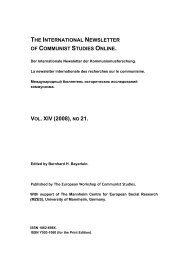11RXNdQ
11RXNdQ
11RXNdQ
You also want an ePaper? Increase the reach of your titles
YUMPU automatically turns print PDFs into web optimized ePapers that Google loves.
articulate a new anti-racist humanism, which would be inclusive rather than exclusive,<br />
and which would be the product of those who formed the majority of its new totality.<br />
This was the basis for the emphasis, at the end of The Wretched of the Earth and in Che<br />
Guevara’s magnificent ‘Socialism and Man in Cuba’ (1965) alike, on the necessity of the<br />
creation of a ‘new man’. ‘Let me say that the true revolutionary is guided by great<br />
feelings of love. … We must strive every day so that this love of living humanity is<br />
transformed into actual deeds, into acts that serve as examples, as a moving<br />
force’ (Guevara 1997:211–13).<br />
Che Guevara, according to Hilda Gadea, was ‘an avid Sartre admirer [and] an adept of<br />
existentialism’ (Gadea 1973:36). In their debates about Sartre’s work, they discussed not<br />
only his existentialism but also his presentation of racial problems in The Respectful<br />
Prostitute (1946). The slogan of the Cuban revolution – ‘the revolution is a praxis which<br />
forges its ideas in action’ – was itself fundamentally Sartrean in conception. The<br />
symbiotic and symbolic alliance between the two men was instantiated when they met<br />
during Sartre’s visit to Cuba in 1960 – at midnight in the National Bank of Cuba, of<br />
which Guevara was at that time the director (Sartre 1961:148, 98). Sartre was deeply<br />
moved by the energy, intelligence and informal human warmth of the Cuban<br />
revolutionaries, remarking of Guevara, ‘This Guevara had been made by the war. It had<br />
stamped its own intransigence on him. The revolution had given him his sense of<br />
urgency, his speed’ (Sartre 1961:60). It was in Cuba that Sartre witnessed, according to<br />
Simone de Beauvoir, ‘happiness that had been attained by violence’: there Sartre<br />
‘realised the truth of what Fanon was saying: it is only in violence that the oppressed can<br />
attain their human status’ (de Beauvoir 1968:503, 606). According to Sartre, Fanon and<br />
Guevara, it was through revolution that the oppressed could attain their own humanity as<br />
well as their freedom. ‘At the level of individuals’, wrote Fanon, ‘violence is a cleansing<br />
force. It frees the native from his inferiority complex and from his despair and<br />
inaction’ (Fanon 1965:73). Sartre, who began by abhorring violence on ethical grounds,<br />
ended by advocating it as the only necessary counter-response by those subjected to it.<br />
This was a choice that, as for Nkrumah or Kaunda, was the product of historical necessity<br />
arising from the liberation wars in settler colonies, or against imperial domination, rather<br />
than a rejection of ethics as such. The corollary of this historical engagement was to<br />
emerge in Sartre’s Critique of Dialectical Reason where he interpolates the violence of<br />
colonialism and anti-colonial response at a philosophical and historical level:<br />
colonialism, in this analysis, consisted of a process in which uncontrolled violence was<br />
gradually transformed to a controlled violence, asserting a legitimacy of rule, as in<br />
Algeria (Sartre 1976a: 727).<br />
Sartre’s unremitting public support for the FLN and their objectives in Algeria,<br />
expressed in the Preface to The Wretched of the Earth and elsewhere, was at the time an<br />
indictable offence. Despite himself requesting it, he escaped prosecution by the<br />
government, but the colonists tried to ensure that he paid the price. In January 1962, a<br />
bomb planted by the OAS destined for his apartment went off in the rue Bonaparte; it was<br />
placed by mistake on the floor above, where the apartment was totally wrecked (Horne<br />
1977:503). Apart from his foundational analysis in ‘Colonialism Is a System’, Sartre’s<br />
articles on Algeria are very much products of engaged moments in the violent history of<br />
the war. They bring out the radical position which he, unlike the vast majority of the




